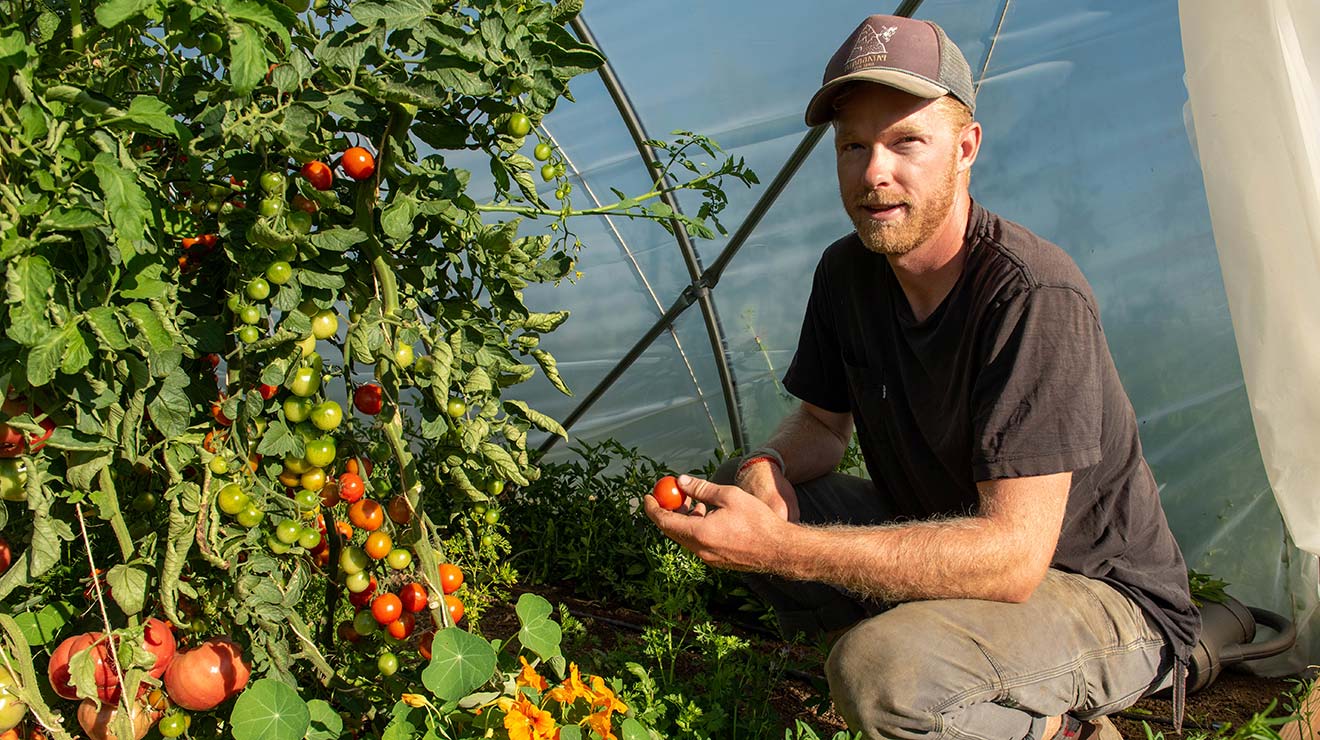
Dennis Lacerte examines tomatoes growing on his one-acre farm outside of Fort Collins. Lacerte was the first participant in a new Larimer County program helping aspiring farmers enter the business. Photo by Valerie Mosley
Dennis Lacerte examines tomatoes growing on his one-acre farm outside of Fort Collins. Lacerte was the first participant in a new Larimer County program helping aspiring farmers enter the business. Photo by Valerie Mosley
When 37-year-old Erin Foster West was in her early 20s living in her home state of Montana, she thought she was going to become a farmer. But after being diagnosed with a chronic disease, she quickly realized the path wasn’t feasible.
“If the Affordable Care Act had existed, and I’d been able to access health insurance, that would have been key, but there’s so many of these barriers along the way,” said Foster West, who works for the advocacy organization National Young Farmers Coalition to remove barriers for the next generation of farmers.
“I would have needed land,” continued Foster West, who is now based in Denver. “I would need water rights and access to some kind of funding, whether that’s a loan or an investment. You need to find a market. You need access to state and federal programs. So there’s a lot that has to fall into place for someone to really be successful.”
A handful of unique training opportunities in Colorado are sprouting up across the state to help the next generation of farmers—whether that’s backyard gardeners or experienced growers—access land and water, adapt to climate change and create sustainable business models.
The programs are especially critical given that farmers in the U.S. are aging faster than young farmers are getting in line to take their place, according to the most recent Census of Agriculture conducted by the U.S. Department of Agriculture. Approximately one-third of the 3.4 million American farmers are over the age of 65, according to the report released in 2019.
“Where’s the food gonna come from?” said 29-year-old Dennis Lacerte, who is currently participating in a relatively new farm-training program in Fort Collins. “I mean, if there’s a younger generation that’s not interested in farming, then that market share I guess just gets handed over to somebody larger.”
While some new farmers are entering the field, the National Young Farmers Coalition has observed many leaving after only a few years, according to Foster West, signaling they lacked the institutional support to make their business sustainable. This is why farm training programs are more important than ever, she added.
But she’d like to see more farm training programs geared towards underrepresented groups in farming, including women, immigrants and people of color. Additionally, while a handful of farm training programs exist, the majority are only offered in English, she said.
“Different communities have different agricultural practices,” Foster West said. “So there’s folks that have immigrated here. Maybe their parents were farm workers, or herders, and they have emigrated from Mexico or elsewhere and may not have training programs that support their agricultural heritage.”
Land, water and business training
The first barrier new farmers run into is finding affordable land with access to water rights—an increasingly challenging task given skyrocketing land prices in response to the state’s ballooning population, a shrinking water supply due to climate change, and an already over-appropriated Colorado River Basin.
As the water director for the National Young Farmers Coalition, Foster West advocates for state and federal policies that will help farmers conserve precious water resources by implementing more efficient irrigation systems, planting more drought-tolerant crops, and utilizing practices that help soil retain more water.
The Farm Business Accelerator Program, a new initiative in Larimer County from the Northern Colorado Foodshed Project, is helping beginning farmers access land and water through a unique collaboration with the City of Fort Collins. In 2020, the city leased 150 acres—part of the “Flores del Sol” natural area—to Poudre Valley Community Farms, a land cooperative focused on increasing local food production and safeguarding land from developers who can easily outbid the average farmer.
Participants in the program can farm on .25 acre to a full acre and can participate in the program for up to three years (though they must reapply each year). The water is purchased in part through the city and paid for by the program.
By providing the initial infrastructure needed to start a farm—land and water access, electrical lines, storage space and coolers—the program aims to give participants a head start at launching their farm business without falling into debt.
“Having land access and water access, some equipment, education and mentorship is exactly what I needed,” Lacerte, the first participant in the program, said as he stood in front of his flourishing one-acre plot, Belafonte Farm, in June 2022.
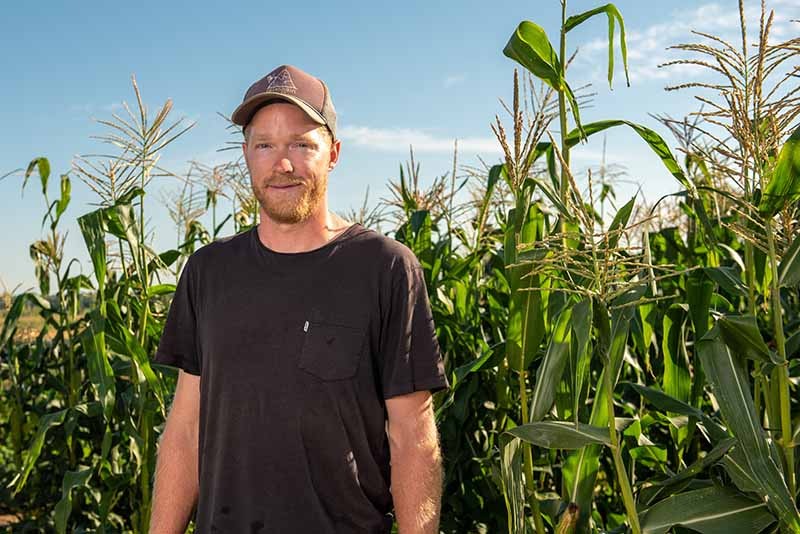
Lacerte at Belafonte Farm. Photo by Valerie Mosley
The program, which costs farmers anywhere from $500 to $1,250 for the first growing season, also includes eight weeks of farm business training through Colorado State University to ensure that beginning farmers’ businesses are financially sustainable. The classes focus on the often overlooked, less glamorous parts of farming: crafting a feasible business plan, coming up with marketing strategies, and filing business taxes.
“At the end of the day, if you can’t pay [your bills] you won’t stay in business,” Lacerte said.
The Old Fort at Hesperus, an educational farm affiliated with Fort Lewis College in Durango, offers an incubator program for experienced farmers looking to launch their business, as well as a farmer-in-training program geared towards those who have the enthusiasm for farming, but lack the experience. Both programs focus on high-elevation, desert growing practices, mostly out of necessity: the farm is located at 7,600 feet, meaning the growing season is shorter and there’s a narrower window for growers to make a profit.
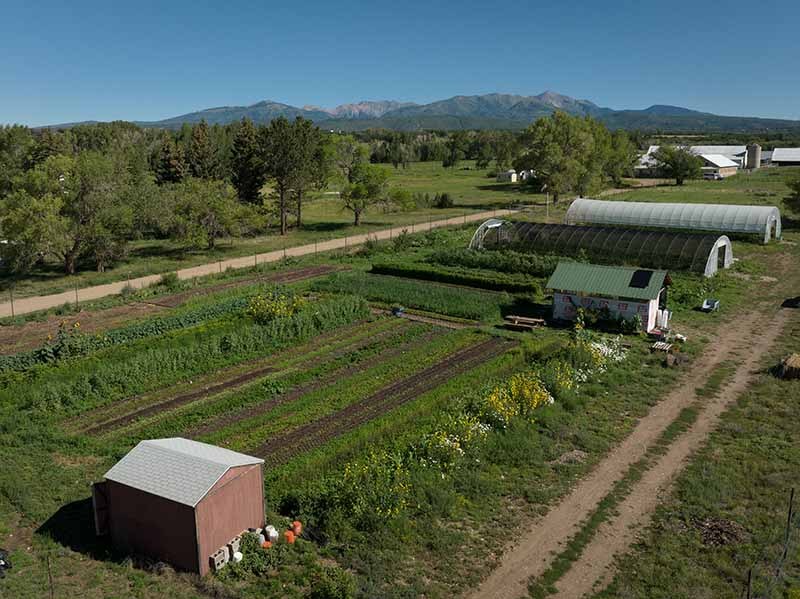
The farmer-in-training plot at the Old Fort at Hesperus sits below the La Plata Mountains in Durango. Photo by Corey Robinson
The programs allow participants to experiment with different growing methods in order for farmers to adapt to rising temperatures and drier conditions due to climate change. But even equipped with the right tools, land access once they leave the program remains a major barrier.
“If you can’t imagine a way that you will ever have secure land access, why would you perceive farming as an opportunity?” said Elicia Whittlesey, the farm program coordinator at the Old Fort at Hesperus. “As a farmer training organization, we’re all looking at how we not only train farmers, but also create an environment where it’s a viable thing to do.”
Incorporating Indigenous knowledge
At the Old Fort farm, anyone identifying as Native can participate in the training programs through grants made available by the national Native American Agriculture Fund. In the past two years, the program has distributed seven stipends to Native farmers, field assistants and interns, according to Whittlesey.
The Old Fort program has begun incorporating Indigenous crops and practices at the farm. Last year, they created a Three Sisters plot, a farming practice utilized by various Indigenous nations of North America which cultivates squash, corn and beans. The food is then donated to the Native American Center at Fort Lewis College.
“We do workshops around the planting and harvest for the community, and just really try to bring the sense of the deep relationship to food and respect for food that comes from those traditional practices,” Whittlesey said.
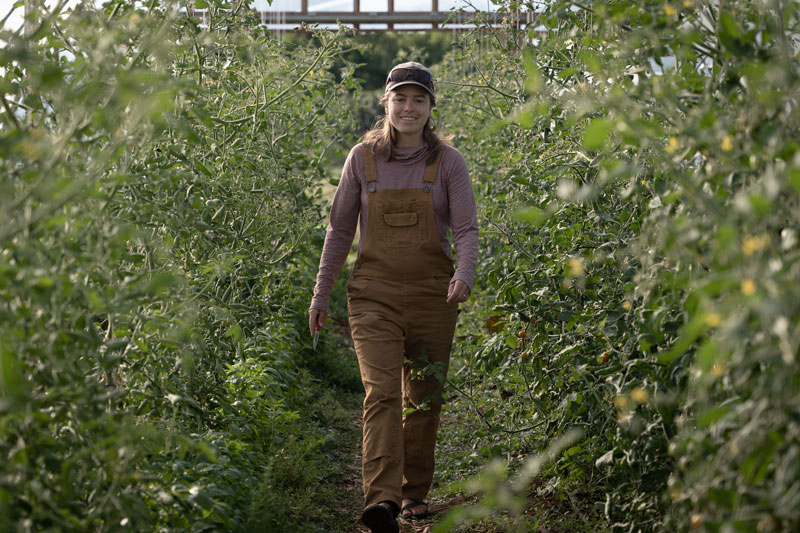
Elicia Whittlesey at the Old Fort at Hesperus. Photo by Corey Robinson
The farm—which is now owned by the Colorado Land Board and managed by Fort Lewis College—is located 25 miles outside of present-day Durango on the ancestral home of the Nuuchiu (Ute) people, who were forced off their land by the U.S. government in 1881. The land also has ceremonial ties to the Jicarilla Apache (Apache), Pueblos of New Mexico, Hopi Sinom (Hopi), and Diné (Navajo) nations.
In the late 19th century, a military fort was built on the land, which later became an American Indian boarding school that operated from 1892 to 1910. The school, similar to hundreds across the country, violently stripped Indigenous children of their culture, language and traditional ways of living.
Agriculture itself was used by the U.S. government as a tool of forced assimilation. The Dawes Act of 1887 divided tribal lands into plots to promote agriculture. Those that did not agree with the practice were deemed non-citizens and were forced off the land, according to the U.S. National Parks Service. As a result, the U.S. government stripped over 90 million acres of tribal land from Indigenous peoples and sold it to white settlers.
Whittlesey said it’s a difficult history to try to grapple with, but the farm program—and Fort Lewis as a whole—is trying to take the initial steps to acknowledge the historic and present harms inflicted on Indigenous people.
“It’s an important history to try to respond to, and our response is not complete,” she said.
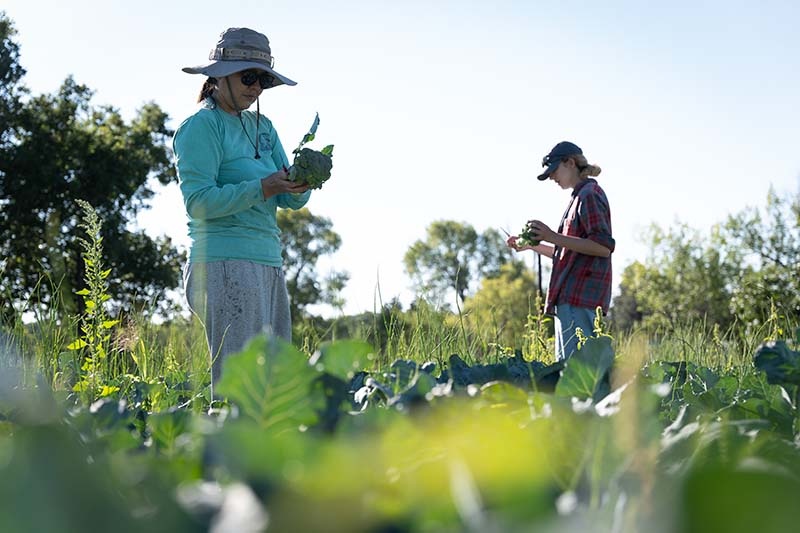
Malori Johnson and Emily Bell harvest broccoli at the Old Fort at Hesperus. Photo by Corey Robinson